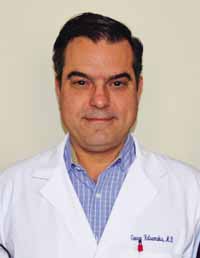
Multiple Sclerosis (MS) is believed to be an auto-immune disease affecting over 400,000 people in the United States. Two thirds of patients are woman. It is the leading cause of neurologic disability among young patients. Research has lead to the approval of 13 drugs since 1993. Our goal at Northwest Neurology is to catch MS early, and once diagnosed, provide aggressive treatment to help you maintain and improve your quality of life.
Multiple Sclerosis can affect any part of the central nervous system. Talk to your healthcare provider if you develop any persistent neurologic symptoms including cognitive impairment, memory loss, fatigue, blindness, imbalance, vertigo, numbness, paralysis, or bowel and bladder difficulty. The majority of newly diagnosed patients will have relapses and remissions. Although MS can be permanently disabling, with early and aggressive treatment, this is not necessarily the case.
Northwest Neurology draws patients not only from the northwest suburbs, but also from Chicago, and the surrounding states. We take a team approach to provide comprehensive diagnosis and treatment of the disease and it’s symptoms. Our goal is to customize treatment and educate patients, making them active participants in their care. We offer Neurocognitive testing under the direction of neuropsychologist Dr. Aaron Malina, PhD. and Neurorehabilitation with Dr. Erin McGonigle MD.
Diagnostic testing may include MRI, thorough blood testing, and spinal fluid analysis. MRI is the most sensitive means for diagnosing MS. We can offer all diagnostics onsite. After determining the appropriate disease treatment approach, we then focus on treating the symptoms of MS. We consider not only traditional medical treatments but also support holistic approaches. For treatments that need medical supervision, we offer onsite supervision and treatment. We encourage patients to participate in physical therapy and support fitMS, a Barrington-based specialist for mobility training and social support.
Our philosophy is that the more aggressively we treat and monitor MS, the better the outcome and quality of life for our patients. We take a team approach and build strong relationships with our patients. Although there isn’t a cure for MS at the moment, the availability of multiple treatments has certainly changed the natural course of the disease, with many more patients living with the disease in a milder and more manageable state.

Dr. George Katsamakis has devoted his interest in Neurology to the care of patients with Multiple Sclerosis. From 1998–2006, he was an Assistant Professor at the Rush University Multiple Sclerosis Center, managing complex MS cases as well as participating in and spearheading novel therapeutic trials in the field. Seeing the need for advanced care outside Chicago, he conceived and directs the Multiple Sclerosis Center of Northwest Neurology founded in 2006. The center is recognized by the National MS Society and the Consortium of MS Centers. We provide comprehensive and compassionate care for more than 1,500 patients with MS.
Dr. Katsamakis has authored or coauthored articles, abstracts, and book chapters primarily devoted to Multiple Sclerosis. He has presented numerous local, national, and international presentations in his field. He received the Leadership Class of 2000 Award presented by the National Multiple Sclerosis Society.
Dr. Katsamakis is board certified by the American Board of Neurology and Psychiatry. His undergraduate degree is from Loyola University, Chicago, and his medical degree is from Rush Medical College, Chicago. Dr. Katsamakis’ residencies include Evanston Hospital, Northwestern University, and Rush University Medical Center, Chicago. He completed a specialty fellowship in Multiple Sclerosis at the Rush University MS Center.